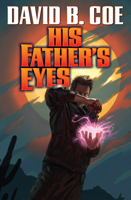A few weeks ago, around the time of the release of Dead Man’s Reach, I broke down the opening paragraphs of that fourth Thieftaker novel, to give you some sense of what I was trying to accomplish on the first page of the book. It was a fairly standard start — effective and, I think, nicely written — but not all that different from past Thieftaker openings.
I’d like to do something similar today with the first few paragraphs of His Father’s Eyes, as a way of contrasting this opening with that other. You’ll see immediately that the first page of this book is very different. The opening is the least conventional of any I’ve ever written. In fact, it breaks many of the rules I usually encourage aspiring writers to follow.
The 2015 Summer-of-Two-Releases Virtual Tour returns to Magical Words for another post about openings. In this one, I break down the opening lines of His Father’s Eyes, the second book in my Case Files of Justis Fearsson series, which just came out last week. You can find the post here. Enjoy!









